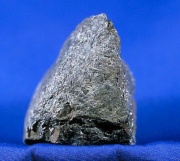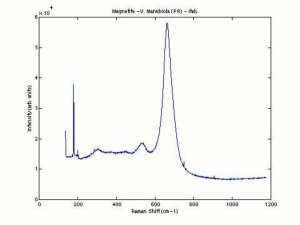Difference between revisions of "Magnetite"
(username removed) |
|||
| (5 intermediate revisions by 4 users not shown) | |||
| Line 4: | Line 4: | ||
Black opaque mineral composed of ferro-ferric oxide that is strongly magnetic. Magnetite is a common mineral and large deposits have been found in Sweden, Norway, the Urals, Italy, Switzerland, Australia, Brazil, United States (New Jersey, Arkansas, Utah, New York, New Mexico, California) and Canada (Ontario, Quebec, Nova Scotia). Magnetite is brittle and fractures unevenly. When it possess a polarity because the molecules had time to line up before the magma cooled, magnetite is called lodestone. Lodestones, or natural magnets, have been found in Siberia, the Island of Elba and in Arkansas. Magnetite was used in antiquity for jewelry, amulet beads, seals and as a substitute for black pearls. It is also used as a black pigment in paints, linoleum, ceramic glazes, and glass. | Black opaque mineral composed of ferro-ferric oxide that is strongly magnetic. Magnetite is a common mineral and large deposits have been found in Sweden, Norway, the Urals, Italy, Switzerland, Australia, Brazil, United States (New Jersey, Arkansas, Utah, New York, New Mexico, California) and Canada (Ontario, Quebec, Nova Scotia). Magnetite is brittle and fractures unevenly. When it possess a polarity because the molecules had time to line up before the magma cooled, magnetite is called lodestone. Lodestones, or natural magnets, have been found in Siberia, the Island of Elba and in Arkansas. Magnetite was used in antiquity for jewelry, amulet beads, seals and as a substitute for black pearls. It is also used as a black pigment in paints, linoleum, ceramic glazes, and glass. | ||
| − | See also [ | + | See also [[iron%20oxide%20black|iron oxide black]]. |
| − | + | [[[SliderGallery rightalign|Magnetiteitaly1.jpg~Raman (U of Parma)]]] | |
== Synonyms and Related Terms == | == Synonyms and Related Terms == | ||
| − | lodestone; ironstone; magnetic iron oxide; black iron oxide; ferro-ferric oxide; ferric ferrous oxide; Magnetit (Deut.); Magneteisen (Deut.); Magneteisenstein (Deut.); magnetita (Esp.; Port.); | + | lodestone; ironstone; magnetic iron oxide; black iron oxide; ferro-ferric oxide; ferric ferrous oxide; Magnetit (Deut.); Magneteisen (Deut.); Magneteisenstein (Deut.); magnetita (Esp.; Port.); magnétite (Fr.); magnetyt (Pol.); magnetite (Port.); magnetiet (Ned.) |
| − | |||
| − | |||
| − | |||
| − | |||
| − | + | == Physical and Chemical Properties == | |
| − | Isometric crystal system; usually octahedrons, sometimes massive. No definite cleavage. Fracture = subconchoidal, uneven, brittle. Strongly magnetic. Luster = metallic to dull. Streak = black. | + | * Soluble in acids. Insoluble in water. |
| + | * Isometric crystal system; usually octahedrons, sometimes massive. | ||
| + | * No definite cleavage. | ||
| + | * Fracture = subconchoidal, uneven, brittle. | ||
| + | * Strongly magnetic. | ||
| + | * Luster = metallic to dull. | ||
| + | * Streak = black. | ||
{| class="wikitable" | {| class="wikitable" | ||
| Line 27: | Line 29: | ||
|- | |- | ||
! scope="row"| Melting Point | ! scope="row"| Melting Point | ||
| − | | 1538 (dec) | + | | 1538 C (dec) |
|- | |- | ||
! scope="row"| Density | ! scope="row"| Density | ||
| − | | 5.18 | + | | 5.18 g/ml |
|} | |} | ||
| − | == | + | == Resources and Citations == |
| − | |||
| − | |||
| − | + | * Mineralogy Database: [http://www.webmineral.com/data/Magnetite.shtml Magnetite] | |
| − | * | + | * Jack Odgen, ''Jewellery of the Ancient World'', Rizzoli International Publications Inc., New York City, 1982 |
* ''The Merck Index'', Martha Windholz (ed.), Merck Research Labs, Rahway NJ, 10th edition, 1983 Comment: entry 4087 | * ''The Merck Index'', Martha Windholz (ed.), Merck Research Labs, Rahway NJ, 10th edition, 1983 Comment: entry 4087 | ||
| − | * ''Encyclopedia Britannica'', http://www.britannica.com Comment: "magnetite" | + | * ''Encyclopedia Britannica'', http://www.britannica.com Comment: "magnetite" [Accessed December 11, 2001]. |
| − | * | + | * C.W.Chesterman, K.E.Lowe, ''Audubon Society Field Guide to North American Rocks and Minerals'', Alfred A. Knopf, New York, 1979 |
* ''The Dictionary of Art'', Grove's Dictionaries Inc., New York, 1996 Comment: "Pigments" | * ''The Dictionary of Art'', Grove's Dictionaries Inc., New York, 1996 Comment: "Pigments" | ||
| − | * Wikipedia | + | * Wikipedia: http://en.wikipedia.org/wiki/Magnetite (Accessed Sept. 10, 2005) |
| − | * | + | * Richard S. Lewis, ''Hawley's Condensed Chemical Dictionary'', Van Nostrand Reinhold, New York, 10th ed., 1993 |
* ''Van Nostrand's Scientific Encyclopedia'', Douglas M. Considine (ed.), Van Nostrand Reinhold, New York, 1976 | * ''Van Nostrand's Scientific Encyclopedia'', Douglas M. Considine (ed.), Van Nostrand Reinhold, New York, 1976 | ||
Latest revision as of 14:10, 6 December 2022
Description
Black opaque mineral composed of ferro-ferric oxide that is strongly magnetic. Magnetite is a common mineral and large deposits have been found in Sweden, Norway, the Urals, Italy, Switzerland, Australia, Brazil, United States (New Jersey, Arkansas, Utah, New York, New Mexico, California) and Canada (Ontario, Quebec, Nova Scotia). Magnetite is brittle and fractures unevenly. When it possess a polarity because the molecules had time to line up before the magma cooled, magnetite is called lodestone. Lodestones, or natural magnets, have been found in Siberia, the Island of Elba and in Arkansas. Magnetite was used in antiquity for jewelry, amulet beads, seals and as a substitute for black pearls. It is also used as a black pigment in paints, linoleum, ceramic glazes, and glass.
See also Iron oxide black.
Synonyms and Related Terms
lodestone; ironstone; magnetic iron oxide; black iron oxide; ferro-ferric oxide; ferric ferrous oxide; Magnetit (Deut.); Magneteisen (Deut.); Magneteisenstein (Deut.); magnetita (Esp.; Port.); magnétite (Fr.); magnetyt (Pol.); magnetite (Port.); magnetiet (Ned.)
Physical and Chemical Properties
- Soluble in acids. Insoluble in water.
- Isometric crystal system; usually octahedrons, sometimes massive.
- No definite cleavage.
- Fracture = subconchoidal, uneven, brittle.
- Strongly magnetic.
- Luster = metallic to dull.
- Streak = black.
| Composition | Fe3O4 |
|---|---|
| Mohs Hardness | 5.5 - 6.5 |
| Melting Point | 1538 C (dec) |
| Density | 5.18 g/ml |
Resources and Citations
- Mineralogy Database: Magnetite
- Jack Odgen, Jewellery of the Ancient World, Rizzoli International Publications Inc., New York City, 1982
- The Merck Index, Martha Windholz (ed.), Merck Research Labs, Rahway NJ, 10th edition, 1983 Comment: entry 4087
- Encyclopedia Britannica, http://www.britannica.com Comment: "magnetite" [Accessed December 11, 2001].
- C.W.Chesterman, K.E.Lowe, Audubon Society Field Guide to North American Rocks and Minerals, Alfred A. Knopf, New York, 1979
- The Dictionary of Art, Grove's Dictionaries Inc., New York, 1996 Comment: "Pigments"
- Wikipedia: http://en.wikipedia.org/wiki/Magnetite (Accessed Sept. 10, 2005)
- Richard S. Lewis, Hawley's Condensed Chemical Dictionary, Van Nostrand Reinhold, New York, 10th ed., 1993
- Van Nostrand's Scientific Encyclopedia, Douglas M. Considine (ed.), Van Nostrand Reinhold, New York, 1976
- The American Heritage Dictionary or Encarta, via Microsoft Bookshelf 98, Microsoft Corp., 1998
- CRC Handbook of Chemistry and Physics, Robert Weast (ed.), CRC Press, Boca Raton, Florida, v. 61, 1980 Comment: density=4.9-5.2

